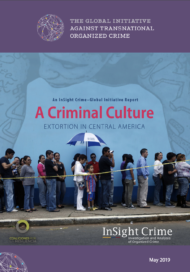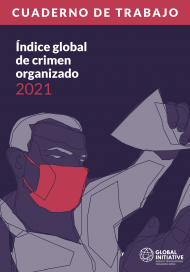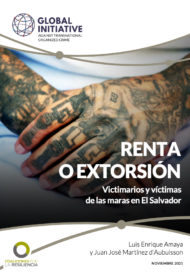To help strengthen local actors’ capacity to enhance community resilience to extortion, on 4 September 2020, 32 Central American participants began a training programme on a virtual platform developed by the Coalitions for Resilience project.

The programme incorporates content from the Action Manual and Guide for Community Resilience to Extortion in Central America, publications that resulted from information exchanges between professionals belonging to the Network of Experts against Extortion. The aim of this programme is to train community leaders to implement strategies against extortion at a local level. Initially designed as a series of on-site workshops at various locations across the region, the virtual tool will enable communities to benefit from this knowledge in spite of movement restrictions imposed by the COVID-19 pandemic.
For five weeks, local civil servants, security and justice officers, civil-society members and community actors from Guatemala, El Salvador, Honduras, Costa Rica and Panama will receive information to help them gain a better understanding of extortion in the region, as well as learn how to pass this knowledge on to their communities. The virtual platform allows participants to learn about the different forms and drivers of extortion, review practical tools on how to react to acts of extortion and access multimedia materials (videos, readings and live discussion forums) to further engage with the content.

At the opening session, Bruno Hamel, Commercial Counsellor at the Embassy of Canada in Guatemala, highlighted the government of Canada’s interest in launching such kinds of initiatives, which aim to contribute to community resilience in the face of this criminal economy.

During the first live discussion forum, on 11 September, participants debated the need to raise awareness about this crime, which affects all socio-economic spheres in the region. They also discussed the need to strengthen trust in institutions to encourage reporting of extortion incidents and reduce the number of unreported incidents, which remains very high in the region.

One of the participants, Tatiana Duarte, said that in Panama extortion is seen as a small-scale crime; however, the country’s national victimization survey of 2017 found that 85.4 per cent of extortion incidents go unreported. This is due to a lack of trust in the authorities’ abilities to help victims. Edgar Morales, from Guatemala, recognized the need for this type of training, which contributes to supporting countries that face the growing phenomenon of gangs and extortion.
At the end of this programme, participants are expected to be able to plan their own trainings and provide dialogue within their communities with the aim of generating ideas and action plans to foster community resilience to extortion. We encourage all those interested in the subject to consult the project’s publications on our website, where you can also sign up to become a member of the Network of Experts against Extortion.
Para contribuir al fortalecimiento de las capacidades de actores locales y a la resiliencia comunitaria contra la extorsión, el 4 de septiembre 32 participantes centroamericanos comenzaron un proceso de formación en la plataforma virtual desarrollada por el proyecto Coaliciones por la Resiliencia.

El proceso formativo incluye la diseminación del contenido del Manual de Acción y la Guía para la Resiliencia Comunitaria contra la Extorsión en Centroamérica Ambas publicaciones son producto del intercambio entre profesionales que forman parte de la Red contra la Extorsión de Centroamérica. Esta formación tiene como objetivo final llegar a los líderes comunitarios que puedan replicar estrategias contra la extorsión a nivel local. Inicialmente concebida como una serie de talleres presenciales en diferentes municipios de la región, esta herramienta virtual permitirá hacer llegar estos conocimientos a las comunidades, a pesar de las restricciones de movimiento impuestas por la pandemia del COVID-19.
En cinco semanas, funcionarios públicos municipales, funcionarios de instituciones de seguridad y justicia, miembros de la sociedad civil y actores comunitarios de Guatemala, El Salvador, Honduras, Costa Rica y Panamá obtendrán conceptos y datos para comprender el fenómeno en la región, así como herramientas para replicar estos conocimientos a nivel comunitario. La plataforma está construida para que los participantes puedan conocer las diversas modalidades y motores de este fenómeno criminal, revisar herramientas prácticas con alternativas para reaccionar frente a una extorsión, así como tener acceso a materiales multimedia (videos, lecturas y foros de discusión en vivo) para reforzar conocimientos.

Durante la inauguración del proceso, el Sr. Bruno Hamel, Consejero Comercial de la Embajada de Canadá en Guatemala, resaltó la importancia que tiene para el Gobierno de Canadá impulsar este tipo de iniciativas que tienen como objetivo contribuir a la resiliencia comunitaria.

Asimismo, durante el primer foro de discusión en vivo realizado el 11 de septiembre, los participantes debatieron la necesidad de abrir un diálogo para visibilizar este fenómeno criminal, presente en todos los ámbitos socioeconómicos de la región. También se habló de la necesidad de avanzar en la confianza institucional para fomentar la denuncia y reducir la ‘cifra negra’ de este delito, que en los países de la región es muy alta. Una de las participantes, Tatiana Duarte, comentó que en Panamá el fenómeno de la extorsión se ve a menor escala, pero sin embargo la encuesta de victimización de su país realizada en 2017 encontró que la cifra oculta por el delito alcanzó el 85,4%. Esto indica que las personas simplemente no denuncian porque consideran que la autoridad no lo puede resolver. Por su parte, Edgar Morales, de Guatemala, también compartió que este tipo de capacitaciones y esfuerzos aportan un grano de arena para cada uno de los países que enfrentan el fenómeno creciente de las pandillas y la extorsión.
Al finalizar el proceso de formación, se espera que los participantes planifiquen sus propios procesos de formación y diálogo en sus comunidades con el objetivo de generar ideas, planes y acciones que resalten la capacidad de resiliencia comunitaria frente a la extorsión. Invitamos a todas y todos los interesados en el tema de la extorsión a consultar los documentos e información generada por el proyecto en la página www.globalinitiative.net/extortion, donde también podrán registrarse para formar parte de la Red de Expertos contra la Extorsión.







